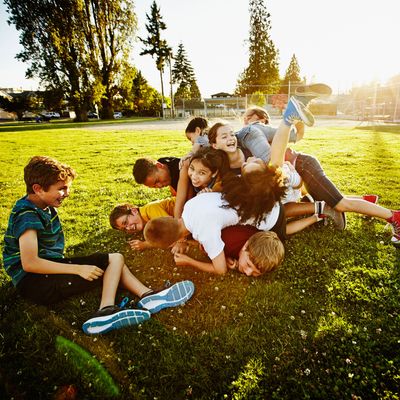
Nearly an hour into my conversation with author and child psychologist Michele Borba, I asked a question relating to her new book, Unselfie: Why Empathetic Kids Succeed in Our All-About-Me World. I asked her how we can teach our children to be empathetic — probably the most important life skill they can acquire, if you believe her book’s argument — in a world that can be so searingly un-empathetic, and so terrifically awful sometimes.
I brought it up because she does in the introduction to the book, which was just published. It’s not every day that one encounters what is essentially a parental-guidance book that mentions Auschwitz, Israel and Palestine, Rwanda, Armenia, and school shootings. But Borba isn’t making an everyday argument. Our conversation was more than a week before the mass shooting at the gay club, Pulse, in Orlando, but it didn’t matter. As I read Dr. Borba’s book, in the back of my mind, I had plenty of other tragedies to think of. It’s possible that all of them could have been avoided if we were a more empathetic society. Unselfie is an engaging and thoughtfully argued book, and its topic — teaching children to be more mindful of other people, and more in control of themselves and their own emotions — is as timely as ever.
Defined simply as the “ability to understand and share the feeling of another,” empathy is one of those things you marvel at when you become a parent, simply because it doesn’t come with the child. To my surprise, in fact, almost nothing did: My daughter was born not knowing how to sleep or how to suckle. She could barely close her eyes, but she was, and continues to be, a fast learner. Still, I have struggled daily, and to exhausting ends, simply to make her understand, for instance, that bugs are alive and to be respected. “It’s not their temperament. Nobody is just born empathetic. It must be taught,” Borba says.
But, she argues in the book, empathy is something we as a society have devalued and, as a result, it has “plummeted” in recent years. Though she doesn’t linger on causation — she’s more interested in plotting out fixes — the title suggests it all. “Our culture has undergone a seismic shift,” she says. And one of the culprits is, unsurprisingly, technology. “Self-promotion, personal branding, and self-interest at the exclusion of others’ feelings, needs, and concerns,” she argues, is “permeating our culture and slowly eroding our children’s character,” and the result is a dip in youth empathy that manifests itself in peer cruelty, bullying, cheating, a weaker capacity for moral reasoning, and a mental-health epidemic in young people.
It’s hard not to find the argument compelling, surrounded as we are by examples of kids being cruel. But Borba is a lover of young people, and her book is focused on actionable advice for parents and caregivers.
She methodically argues through the book that there are nine basic habits that help children “navigate the emotional minefields and ethical challenges” they will face in life. The first four, she writes, are ones that must be developed in young children as the “fundamentals” of empathy: emotional literacy, which teaches children to understand the feelings and needs of themselves and other people; moral identity, which gives them values and integrity; perspective, so that children can put themselves in the place of others; and moral imagination, which allows children to use art like books and films as a source of inspiration.
If this sounds like basic psychology, in some ways, it is. And it might be fair to consider it a testament to how bad things have gotten, but in reality, Dr. Borba knows that it’s not simply laziness that’s gotten us here: Families today are faced with ever-increasing challenges. Mothers and fathers work more hours than they ever have, often without benefits or paid time off. Many parents have jobs that expect them to answer emails (and look at their phones) 24 hours a day. Wages aren’t really rising in a way that competes with the costs of living, and there is the pervasive sense that the world around us is becoming increasingly less hospitable and less safe. Is it any wonder that parents don’t have time for exercises to ensure their kids are kind to others?
And yet, Dr. Borba is arguing that it is essential we equip ourselves with the ability to teach our children kindness, self-respect, and dignity. “We are kind even if no one’s looking,” is one of the “family mottos” she suggests adopting. “Be a role model” for your children, she goes on. Ask yourself and your children, “Who am I? Does this go against my beliefs?”
The book focuses on the family dynamic inside the home, but also moves to another space that can often be a battleground: the school. After all, if children are having empathy problems, one can argue that parents are, too. And between them, the school officials, teachers, and students, there are often many conflicting opinions about what’s best for the children. Unselfie offers basic conflict-resolution advice for families that can also can be applied to schools and parent groups.
There is a sense, when reading Unselfie, that so much is possible. That, of course, we’re going to raise our children to be loving and kind and that we all have our kids’ best interests at heart. But the truth is that, day-to-day, it’s very hard to keep those goals visible because we are so very busy. Borba’s book makes the case that our efforts can and will be repaid in a more empathetic world moving forward. It’s tempting to believe her.




